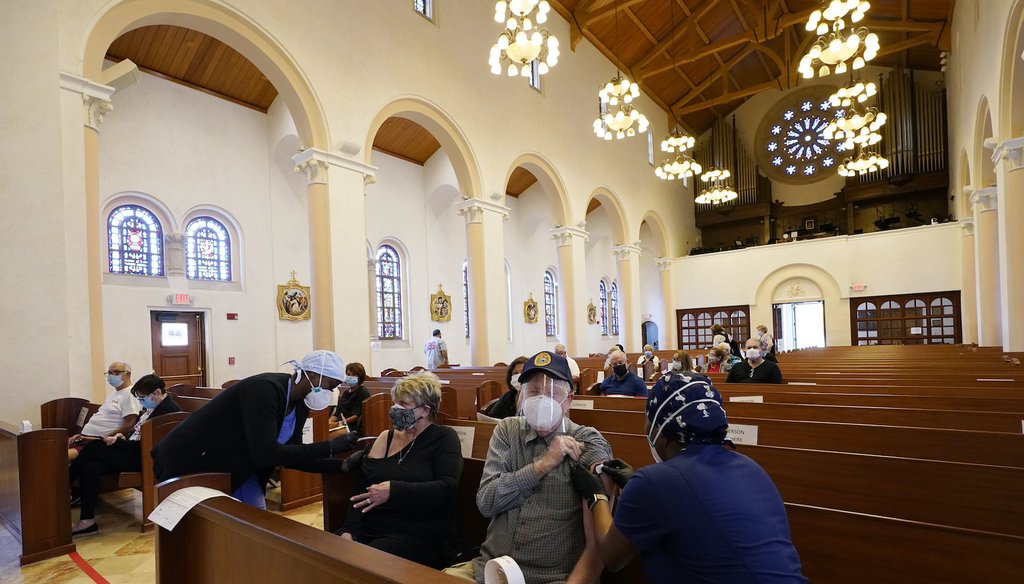

Our only agenda is to publish the truth so you can be an informed participant in democracy.
We need your help.


Diane and Jack Leahy of Miami Lakes, Fla., receive the second dose of the Moderna COVID-19 vaccine at St. Patrick Catholic Church, Monday, March 1, 2021, in Miami Beach, Fla. (AP Images)
The Food and Drug Administration granted emergency use authorization to three COVID-19 vaccines.
The clinical trial results and other requirements for emergency use are little different from what is required for final approval.
An Instagram post from a Tampa Bay nurse casts doubt on the value of the COVID-19 vaccines.
"So, you injected the non-FDA-approved experimental agent, but you still have to wear a mask and social distance?" the March 30 post asks. "Does that imply the jab, the mask and the social distancing don’t work? #sodumb"
Here, we check the claim that any of the COVID-19 vaccines rely on a "non-FDA-approved experimental agent." FDA is the U.S. Food and Drug Administration.
The claim’s main flaw is it fails to reflect that the FDA authorized the vaccines after months of clinical testing.
In a public health emergency, there’s a defined process to expedite the use of promising drugs. The rationale is that during a crisis that poses an immediate threat to peoples’ lives, it is unethical to stick with the conventional approval process.
The new drugs must be fully tested in clinical trials involving tens of thousands of participants. Drug makers have to submit reports on the outcomes and effects on every participant. The chemistry behind the drug, details of the manufacturing process, and the details of the quality controls in place are also required.
The data has to show that the drug is both safe and effective.
The FDA issued emergency use authorizations for the Pfizer, Moderna and Johnson and Johnson vaccines. While that falls short of a final approval, Northwestern University professor of medical ethics Seema Shah said that’s a distinction with little difference.
"An emergency use authorization has a slightly lower bar to cross than full approval, but has come about after a comprehensive review of the data," Shah said. "Most of the steps cut out by the FDA have to do more with paperwork than with stringency of review."
Drug makers must continue to monitor and report any negative outcomes that follow vaccination. That ongoing process underlies the dispute over how to describe the vaccines.
While vaccine skeptics often use the term "experimental agent" when referring to the vaccines, the FDA refers to the drugs as "investigational vaccines."
The agency’s authorization letters tell drug makers to file "periodic safety reports at monthly intervals" under an "investigational new drug" tracking system.
The manner in which the words are applied "is linked to interpretation," said Ross Upshur, head of the Division of Clinical Public Health at the Dalla Lana School of Public Health in Toronto.
"Experimental agent" emphasizes uncertainty. "Investigational" links back to the clinical trials that preceded the emergency authorization.
The nurse behind the post, Erin Marie Olszewski, has appeared on the conservative networks Fox News and One America News. We emailed her through her website and did not hear back.
An Instagram post described the COVID-19 vaccine as a "non-FDA-approved experimental agent."
While the vaccines await full FDA approval, the FDA formally authorized their use after reviewing months of data involving tens of thousands of clinical trial participants. Experts in medical ethics said there’s little difference between the trial results that lead to emergency use authorization and final approval.
Evaluation of the vaccines continues and drug makers must file monthly reports on any adverse outcomes.
We rate this claim Mostly False.
Erin Marie Olszewski, Instagram post, March 30, 2021
America’s Frontline Doctors, White Paper On Experimental Vaccines For COVID-19, accessed March 31, 2021
U.S. Food and Drug Administration, Emergency Use Authorization for Vaccines Explained, Nov. 20, 2020
U.S. Food and Drug Administration, Pfizer-BioNTech COVID-19 Vaccine, Feb. 3, 2021
U.S. Food and Drug Administration, Authorization letter, Feb. 25, 2021
U.S. Food and Drug Administration, Moderna COVID-19 Vaccine, Feb. 3, 2021
U.S. Food and Drug Administration, FDA Issues Emergency Use Authorization for Third COVID-19 Vaccine, Feb. 27, 2021
Lancet Infectious Diseases, The granting of emergency use designation to COVID-19 candidate vaccines: implications for COVID-19 vaccine trials, Dec. 8, 2020
Statnews, A $30 billion gamble: Pandemic expert calls for making Covid-19 vaccines before we know they work, April 7, 2020
Vaccine, Key criteria for the ethical acceptability of COVID-19 human challenge studies: Report of a WHO Working Group, Jan. 22, 2021
NIH Clinical Trials, KBP-201 COVID-19 Vaccine Trial in Healthy Volunteers, July 16, 2020
Email exchange, Ross Upshur, head of Division of Clinical Public Health, Dalla Lana School of Public Health, March 31, 2021
Email exchange, Seema K. Shah, associate professor and associate director of research ethics, Northwestern University Feinberg School of Medicine, March 31 2021
In a world of wild talk and fake news, help us stand up for the facts.
